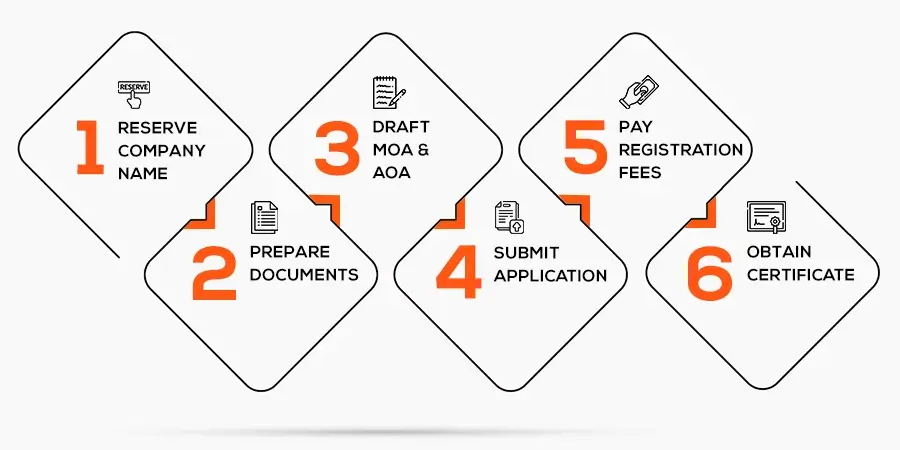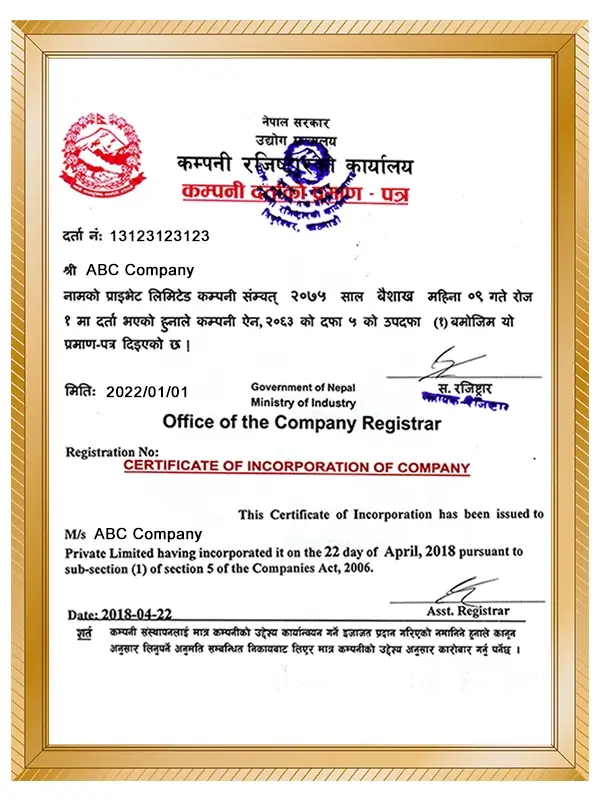Starting a business takes careful planning, hard work, and thoughtful preparation. Registering your company is an important step in this process.
In 2024, the Company Registrar Office reports that there are 319,900 registered companies in Nepal. Every year, the number of new businesses getting registered keeps increasing.

If you are starting a new business, registering your company can seem overwhelming. Below is a step-by-step guide for registering a company in Nepal. It covers the steps, requirements, and things to consider.
Types of Companies
There are three types of companies that can be registered under the Companies Act 2063 (2006) in Nepal. They are as follows:
- Private Limited Company (PLC)
- Public Limited Company (PLC)
- Non-Governmental Organization (NGO)
1. Private Limited Company (PLC)
To establish a Private Limited Company, you only need at least one shareholder. This means even a single person can create and own a Private Limited Company. However, there is a maximum limit of 101 shareholders.
You will need a minimum capital of NPR 100,000 to establish a private limited company in Nepal.
2. Public Limited Company (PLC)
A Public Limited Company is a business entity in which ownership is divided into shares that are publicly traded on a stock exchange. To establish PLC, a minimum of seven shareholders is required, and a minimum capital of NPR 10,000,000 is necessary in Nepal.
3. Non-Governmental Organization (NGO)
A Non-Profit Organization (NGO) is a legal entity created for social, charitable, or humanitarian purposes. To set up an NGO, you need at least five founders.
6 Simple Steps to Register a Company

Here is the step-by-step process to register a company. Follow these six simple steps to register a company in Nepal:
- Check Your Company Name Availability and Reserve It
- Prepare the Required Documents
- Draft MOA and AOA
- Submit the Company Registration Application to OCR
- Pay the Registration Fees
- Obtain a Company Registration Certificate
Step 1. Check Your Company Name Availability and Reserve It
To begin the registration process, first, check your company name availability. If your desired company name is available, reserve it. Make sure your chosen company name is unique and follows the rules of the Companies Act 2063 Nepal.
Here are the simple steps to check availability and reserve the company name:
- Go to www.ocr.gov.np. Find ‘Company Online Services‘ menu.
- Signup and login.
- Fill out the form with the necessary information and submit it for approval.
After submitting the company name for approval, the OCR will review it. This process usually takes 2-4 days to receive approval for the name.
Step 2. Prepare the Required Documents
Prepare the necessary documentation for company registration. This includes:
- Company registration application form.
- Articles of Association and Memorandum of Association.
- Identification and address proof of shareholders/directors.
- Passport-sized photos of shareholders/directors.
- Rent agreement or land ownership certificate.
- Co-authorization letter for company registration (if the application is being submitted by a third party).
Step 3. Draft MOA and AOA
Create the two most important documents for your company. They are the Memorandum of Association (MOA) and the Articles of Association (AOA). These documents are essential. They define your company’s objectives, ownership structure, and internal rules.
Memorandum of Association (MOA):
- Serves as a foundational document for the company.
- Highlights overarching goals and objectives.
- Defines the company’s scope of operations.
- States the reason for the company’s existence.
- Specifies the activities the company intends to undertake.
Articles of Association (AOA):
- Focuses on the internal workings of the company.
- Outlines rules and regulations for internal management and administration.
- Covers aspects such as the appointment of directors.
- Addresses shareholder rights.
- Defines decision-making processes within the company.
Once you’ve drafted these important documents, the next step is to ensure their legal validity. This involves having both the MOA and AOA notarized by a public notary. Notarization adds an extra layer of authentication and legal standing to your documents. It provides assurance to stakeholders and regulatory bodies.

Step 4. Submit the Company Registration Application to OCR
Submit the company registration application form and necessary documents to the Office of the Company Registrar. You can do this by visiting them in person at Tripureshwor, Kathmandu 44600, Nepal.

Step 5. Pay the Registration Fees
You need to pay a company registration fee set by the government. This fee depends on the type of company and the amount of authorized capital.
Below, we’ve made a list of the company registration fees. Take a look and make sure you pay the right amount.
Registration fee for private limited companies:
| Amount of Authorized Capital (NPR) | Registration Fee (NPR) |
|---|---|
| Up to 1,00,000 | 1,000 |
| 1,00,001 to 5,00,000 | 4,500 |
| 5,00,001 to 25,00,000 | 9,500 |
| 25,00,001 to 1,00,00,000 | 16,000 |
| 1,00,00,001 to 2,00,00,000 | 19,000 |
| 2,00,00,001 to 3,00,00,000 | 22,000 |
| 3,00,00,001 to 4,00,00,000 | 25,000 |
| 4,00,00,001 to 5,00,00,000 | 28,000 |
| 5,00,00,001 to 6,00,00,000 | 31,000 |
| 6,00,00,001 to 7,00,00,000 | 34,000 |
Registration fee for public limited companies:
| Amount of Authorized Capital (NPR) | Registration fee (NPR) |
|---|---|
| Up to 1,00,00,000 | 15,000 |
| 1,00,00,001 to 10,00,00,000 | 40,000 |
| 10,00,00,001 to 20,00,00,000 | 70,000 |
| 20,00,00,001 to 30,00,00,000 | 1,00,000 |
| 30,00,00,001 to 40,00,00,000 | 1,30,000 |
| 40,00,00,001 to 50,00,00,000 | 1,60,000 |
| Above 50,00,00,000 | 3000 for each 1,00,000 |
Step 6. Obtain a Company Registration Certificate
The Office of the Company Registrar will review your application and documents. If everything is okay, they will give you a certificate to show that your company is officially registered.

Post-Registration Obligations
Once you have successfully registered your company, it’s crucial to be aware of the following post-registration obligations. Let’s break down these important steps:
- Make a Company Stamp
- Tax Registration (PAN/VAT)
- Open a Business Bank Account
- Brand Protection (Trademark, Copyright, Patent)
- Create a Website and Social Media Accounts
1. Make a Company Stamp
Once you have your company registration certificate, it’s time to make a company stamp. Remember to follow the OCR’s rules.
Keep the stamp size under 38mm x 38mm, and include your company’s name and registration number.

2. Tax Registration (PAN/VAT)
PAN Registration
Register for a Business PAN with the Inland Revenue Department (IRD). Then, get your PAN certificate. Every business in Nepal needs its own Business PAN.
Before visiting the IRD, ensure you have the following documents:
- Photocopy of Certificate of Registration
- Memorandum of Association (MOA), and Articles of Association (AOA)
- Company stamp
- Photocopy of citizenship certificates of all shareholders
- Two passport-size photos of shareholder
- Personal PAN card of one shareholder
- Rent agreement
- Submission number of the online form filled at IRD’s website
- Application form with a Rs. 10 stamp
VAT Registration
Not all businesses need to register for VAT in Nepal. Here are the main things to know about VAT registration in Nepal:
- Threshold Turnover: If your business’s annual turnover exceeds a specific threshold, you need to register for VAT.
- Services: Annual turnover more than NPR 20 Lakh.
- Goods: Annual turnover more than NPR 50 Lakh.
- Mixed (Goods & Services): Annual turnover more than NPR 20 Lakh.
- Mandatory Registration: Some types of businesses are required to register for VAT compulsorily. Check the list of companies in Nepal mandatory to register for VAT.

3. Open a Business Bank Account
Open a business bank account in the name of the registered company. Use it to manage financial transactions. To activate the account, you may need to deposit an initial amount. This amount can vary depending on the bank, but it is typically NPR 10,000.
4. Brand Protection (Trademark, Copyright, Patent)
Think about safeguarding your brand by registering trademarks, copyrights, or patents.
5. Create a Website and Social Media Accounts
Get your company online! Make a website to show your services. Join social media like Facebook, Instagram, and LinkedIn to connect with more people. Promote your brand, and make your business grow in the online world.

Benefits of Company Registration
Registering your company, also known as business incorporation, comes with various advantages. The specific benefits can differ based on the type of business entity you choose. However, some common benefits include:
- Legal Recognition:
Registering your business gives it legal recognition as a separate entity from you, the owner. This separation helps limit your personal liability for the company’s debts and obligations. - Limited Liability Protection:
Their personal assets are usually safe from the company’s debts. They are also protected from the company’s legal obligations. - Credibility and Trust:
When a company registers, customers, suppliers, and partners trust and believe in it more. The company appears stable, giving a committed impression towards its activities. - Access to Funding:
Registered companies can access funding from banks, investors, and financial institutions. This makes it easier for them to get the money they need. - Brand Protection:
Registering the business name and logo provides legal protection. This helps in building and protecting the brand identity of the company. - Government Contracts and Tenders:
Government agencies and big corporations often prefer dealing with registered companies. - Compliance with Regulations:
Registering ensures that the company follows the law, avoiding penalties and legal problems.
Why a Company Registration Agency is Your Best Choice in Nepal
Choosing a registration agency in Nepal is a smart decision. There are many reasons that make it the best choice. They offer expertise to help manage a business effectively. Here are some key benefits:
- Time Saving:
Registering a company is a time-consuming process. This includes various documents and coordination with government officials. The registration agency speeds up the process. This allows you to save time and focus on other aspects of your business. - Legal Compliance:
The company registration agency stays current on legal changes. The agency ensures your business complies with necessary laws. This reduces the risk of future legal problems. - Perfect Documentation:
The company registration agency prepares the correct documents. This minimizes the chances of errors and ensures a smooth application process. - Cost-Effective:
Hiring a registration agency comes with fees. But, it can save time and effort and prevent legal problems. In the long run, it is a cost-effective option. - Post-Registration Services:
The agency also helps with ongoing compliance, tax filings. This comprehensive support can be invaluable as your business is operating in Nepal.
In conclusion, a company registration agency can be your best choice for a hassle-free and compliant business setup in Nepal.
Take an Expert Guidance
Connect with Mr. Dipendra Shah, bringing 10 years of experience to guide you.
Contact Details:- Name: Dipendra Shah
- Experience: 10 Years
- Contact No. / Whatsapp: +977 - 9851253180
FAQs
Below are answers to some frequently asked questions about company registration in Nepal:
How long does it take to register a company in Nepal?
In Nepal, registering a company typically takes around 7 to 10 business days. However, once your chosen company name gets approved, you can wrap up the registration in a faster 2 to 3 days.
Keep in mind that the exact timeline might vary based on how busy government offices are and how quickly they process applications.
Where is the Office of the Company Registrar (OCR) located in Nepal?
The Office of the Company Registrar (OCR) is situated in Tripureshor, Kathmandu.
Are there any criteria for choosing a name for a private limited company?
Yes, there are criteria for selecting a company name. It must be unique, not misleading, and comply with the Companies Act 2063 Nepal.
How long does it take to get the company name approved in Nepal?
The approval process for the company name can take 2 to 4 days.
How can I check if a company is registered in Nepal?
To check if a company is registered or not, follow this steps:
- Go to the Office of Company Registrar’s website: www.ocr.gov.np.
- If you’re new, sign up and log in. Find the “Check Company Name” option in the menu.
What is the cost of registering a company in Nepal?
The registration costs vary depending on the authorized share capital and the registration fee.
- Private Limited Company: The minimum capital is NPR 1,00,000, and the registration fee is NPR 1,000.
- Public Limited Company: The minimum capital is NPR 1,00,00,000, and the registration fee is NPR 15,000.
- Non-Profit Companies (NGO): The NGO registration fee is NPR 15,000.
Can foreign nationals register a company in Nepal?
Yes, foreign nationals can register a company in Nepal. But there are rules to follow, and it depends on the kind of business and how much money is being invested.
Do foreigners need a local partner to register a company in Nepal?
Yes, foreigners are required to appoint at least one Nepalese citizen as a director.
How can a company renew its registration in Nepal?
To renew your registration, it is necessary to submit an annual report to the Company Registrar’s Office every year. Failure to renew your registration can lead to fines and penalties.
What are the ongoing compliance requirements for registered companies?
Companies in Nepal must fulfill annual compliance requirements, which include filing annual returns, conducting annual general meetings, and submitting financial statements.
Can I change the name or address of my company after registration?
Yes, you can change your company’s name or address, but you’ll need to follow the required steps and get approval from the Company Registrar’s Office.
Here is a detailed guide on how to change your company name and address in Nepal.
For changing the company name, follow this guide: https://companysewa.com/blog/change-company-name-nepal/
If you need to update your company address, refer to this guide: https://companysewa.com/blog/change-company-address-nepal/
